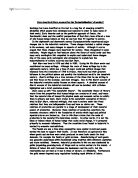Marx used the term ‘production relations’ also. This was to designate real property relations – effective control and/or revenue rights – over productive assets. He used production relations also to show technology in the broadest sense – “that by means of which human beings engage in productive activities”. Therefore, the means of production such as instruments and tools, the organisation of the production process and also knowledge are included in these ‘productive forces’.
Marx contended that these modes of production he first identified in The German Ideology – feudalism, capitalism and socialism among others – are real, natural divisions of human history, and that understanding their internal functioning is indispensable for grasping the course of history itself. Indeed, Cohen (in Karl Marx’s Theory of History: A Defence) explains that Marx’s first ‘master thesis’ is that “the level of development of productive forces explains the nature of the economic structure”. This will be discussed, along with the second ‘master thesis’, later.
The second key term crucial to understanding Marx’s link between technological and political change is ‘alienation’. Indeed, the reason the worker was ‘alienated’ was entirely due to technological change. Marx cites four reasons for the worker being alienated. Firstly, there is alienation from the ‘product of labour’. The worker no longer works for himself, but for the capitalist, and all profit goes to him and to providing more technology (in the form of capital) to keep the worker on his subsistence wages. Secondly, the worker is alienated from the ‘process of labour’. With division of labour (which is possible due to technological changes), the worker is simply a part of the process chain, and can no longer be said to have produced the product himself. The last two are alienation from ‘species-being’ and from one’s own fellow human beings. These two are best explained by Marx himself: “Man is alienated from other men. When man confronts himself, he also confronts other men…In work [the worker] does not belong to himself but to anther person…This is the relationship of the worker to his own activity as something alien.”
Therefore, these technological concepts of alienation are different in their relation to political change (and their critique of capitalism) than ‘property relations’. It is far less about explaining the nature of political change, and more about reasons for political change: to “emancipate the whole of oppressed humanity [and] put an end to all forms of exploitation of one section of society by another.” (from the communist party of Russia’s political program). This is understandable as Marx’s discussion of alienation features mostly in his earlier writings, when he is setting out his critique of capitalism and reasons for change. When property relations and alienation are taken together, it shows how technological change is part of the endogenous process that shapes human history.
The second ‘master thesis’ of historical materialism discussed by G.A.Cohen is also useful at this point. Here, economic structures or ‘modes of production’ explain legal and political superstructures. What is relevant is that Cohen distinguishes between ‘restricted’ and ‘inclusive’ historical materialism. For restricted historical materialists, the two ‘master theses’ together hold that economic structures explain those non-economic phenomena that have effects on social relations of production. But for inclusive historical materialists, this is split into two distinct claims – forces of production (in other words, technology) explain property or productive relations, and these in turn explain the legal and political superstructure.
Both of these types of historical materialism, nevertheless, do not dispute a link between technology and political change (even though restricted materialism produces a weaker link because it is not a theory of everything historical). However, Plamenatz’s Man and Society makes an entirely different claim.
“Marx and Engels speak, not of the steam-and-coal or factory epoch, but of the capitalist or bourgeois epoch; they speak not of the windmill or workshop or strip-agriculture epoch but of the feudal epoch, having sometimes in mind the system of property in land and sometimes the dominant social class.” He, along with other critics of Marxism such as M.M.Bober, points out that Marx made no attempt to show that slavery and serfdom arose out of or are connected with different methods or techniques of production. However, there are three criticisms of this approach. Firstly, different technological bases did exist in these societies – even if they were not obvious. The same tools may have been used, but the way in which production was organised was different –forms of cooperation were different, as were property relations. Secondly, although admittedly class-structures are used by Marx as the overriding factor to distinguish between different historical epochs, this is because it is the mode of production and technology that shapes class structure, as explained beforehand. And finally, Marx reserves most of his technological analysis for capitalism, not slavery or serfdom.
Nevertheless, Plamentz does have a point in that the link is not essential or ‘deep’ and that there are other factors of political change, such as “moral, legal and political relations between men and the divisions of social classes arising out of these relations”. Indeed, part of reason why Marxism was not successful in the capitalist world (why significant political change did not happen after capitalism) was that technological change ‘delinked’ itself from political change. The next major technological step after Marx’s writing was the move from a manufacturing-based economy to a more service-based one where Marx’s theory of ‘alienation’ of workers could no longer be as easily applied. This technological change was not accompanied by any significant political change, and so the link between the two cannot be said to be fundamental to human history.
Marx, Poverty of Philosophy
Levine, Engaging Political Philosophy
Levine, Engaging Political Philosophy
Lenin, Materials Relating to the Revision of the Party Program
Plamenatz, Man and Society
Plamenatz, Man and Society







